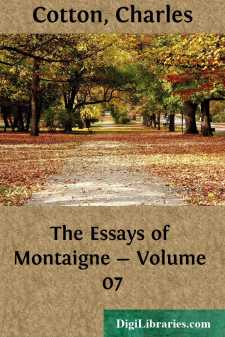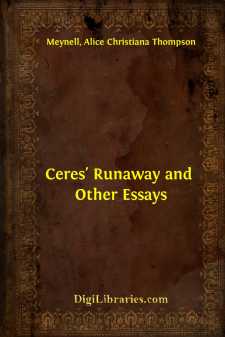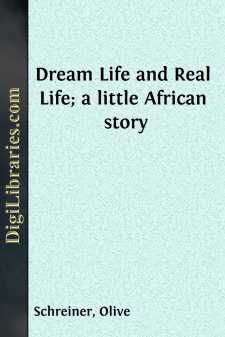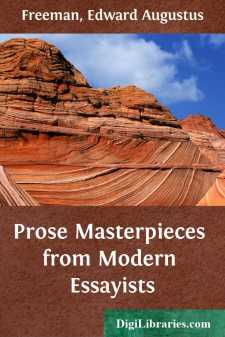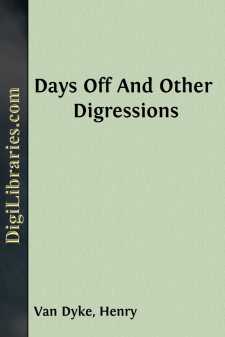Literary Collections
- American 84
- Ancient, Classical & Medieval 14
- Asian 1
- Australian & Oceanian 1
- Canadian 55
- Continental European 121
- English, Irish, Scottish, Welsh 179
- Essays
- General 24
- Letters 46
- Middle Eastern 1
Essays Books
Sort by:
The Chimney-Pots. y windows look across the roofs of the crowded city and my thoughts often take their suggestion from the life that is manifest at my neighbors' windows and on these roofs. Across the way, one story lower than our own, there dwells "with his subsidiary parents" a little lad who has been ill for several weeks. After his household is up and dressed I regularly discover him...
more...
by:
Charles Cotton
A CONSIDERATION UPON CICERO One word more by way of comparison betwixt these two. There are to be gathered out of the writings of Cicero and the younger Pliny (but little, in my opinion, resembling his uncle in his humours) infinite testimonies of a beyond measure ambitious nature; and amongst others, this for one, that they both, in the sight of all the world, solicit the historians of their time not...
more...
by:
Bernard Shaw
The Child is Father to the Man Is he? Then in the name of common sense why do we always treat children on the assumption that the man is father to the child? Oh, these fathers! And we are not content with fathers: we must have godfathers, forgetting that the child is godfather to the man. Has it ever struck you as curious that in a country where the first article of belief is that every child is born...
more...
CERES’ RUNAWAY One can hardly be dull possessing the pleasant imaginary picture of a Municipality hot in chase of a wild crop—at least while the charming quarry escapes, as it does in Rome. The Municipality does not exist that would be nimble enough to overtake the Roman growth of green in the high places of the city. It is true that there have been the famous captures—those in the Colosseum,...
more...
by:
Olive Schreiner
I. DREAM LIFE AND REAL LIFE; A LITTLE AFRICAN STORY. Little Jannita sat alone beside a milk-bush. Before her and behind her stretched the plain, covered with red sand and thorny karoo bushes; and here and there a milk-bush, looking like a bundle of pale green rods tied together. Not a tree was to be seen anywhere, except on the banks of the river, and that was far away, and the sun beat on her head....
more...
by:
Louis Becke
Perhaps the proper title of this article should be "The Influence of American Enterprise upon the Maritime Development of the first Colony in Australia," but as such a long-winded phrase would convey, at the outset, no clearer conception of the subject-matter than that of "The Americans in the South Seas," we trust our readers will be satisfied with the simpler title. It is curious,...
more...
THE SCIENCE OF HISTORY. A LECTURE DELIVERED BY JAMES ANTHONY FROUDE AT THE ROYAL INSTITUTION FEBRUARY 5, 1864. Ladies and Gentlemen,—I have undertaken to speak to you this evening on what is called the Science of History. I fear it is a dry subject; and there seems, indeed, something incongruous in the very connection of such words as Science and History. It is as if we were to talk of the color of...
more...
ONE of the most delightful books in my father's library was White's "Natural History of Selborne." For me it has rather gained in charm with years. I used to read it without knowing the secret of the pleasure I found in it, but as I grow older I begin to detect some of the simple expedients of this natural magic. Open the book where you will, it takes you out of doors. In our broiling...
more...
by:
Henry Van Dyke
DAYS OFF "A DAY OFF" said my Uncle Peter, settling down in his chair before the open wood-fire, with that air of complacent obstinacy which spreads over him when he is about to confess and expound his philosophy of life,—"a day off is a day that a man takes to himself." "You mean a day of luxurious solitude," I said, "a stolen sweet of time, which he carries away into some...
more...
It is not a little unfortunate that no one can attempt the essay form nowadays, more especially that type of essay which is personal, reminiscent, “an open letter to whom it may concern,” without being accused of trying to write like Charles Lamb. Of course, if we were ever accused of succeeding, that would be another story! There is, to be sure, no doubt that the gentle Elia impressed his form and...
more...



